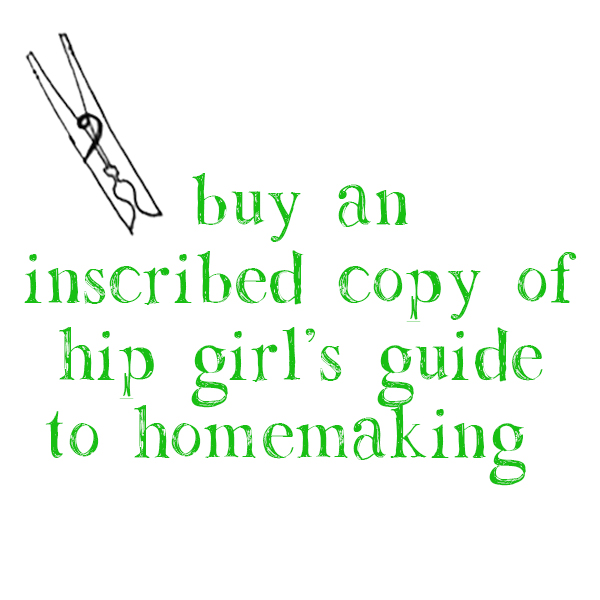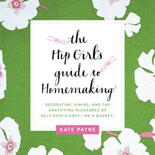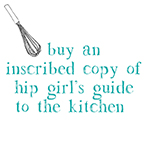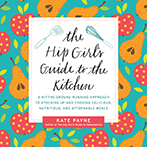Poor Girl Gourmet book giveaway
Good food is something that is so important to me and my family. I’m not just talking about flavor, but that comes as part of the package when we make our consumer choices based on how the animals, vegetables and grains we buy were treated, processed and shipped to us.
Some of you might know about my food stamps story, which I tell at length in my book (out in April). We moved to NYC and became acutely aware of our budget, $201 per month to be exact. While we worked long hours as a grad student and both of us freelance artists getting our careers off the ground, we needed help. We received food stamps from NYC for one year while J was in school. With this money we were able to eat all our meals at home (all three, really) and buy the majority of our food from local/sustainable sources all within the constraints of that $201, sometimes going over by $20-30; $230 for a month’s worth of food is still not breaking the bank for many under-employed people. Meat, of course, became a luxury item since we didn’t want to buy poor-quality, low-cost meats. We sourced our groceries from our food coop, from farmers markets around NYC (many of which accept EBT/food stamps), from pick-your-own farms and even one or two side dishes during the growing seasons from our own back-deck, bucket garden.
There’s still a huge stigma surrounding what food stamps recipients should spend money on, and unfortunately the roots stem deep into socio-economic factors and the still-very-prevalent stereotypes and rhetoric of welfare. As a former EBT recipient who was harassed in my food coop (of all places) for paying with EBT and owning an iPhone, I know it can be difficult. But as a self-employed person who still can’t afford health insurance, I’d rather spend an extra $1 at the grocery store on chicken raised without antibiotics than take my chances on food that’s not truly proven safe from a long-term health perspective. Medical bills are certainly not in our budget. We shouldn’t have to choose between taking care of our bodies with high-quality food and spending as little as possible on highly-processed, factory-farmed or GMO foods.
I know from experience that you don’t have to have money to eat food that’s both good for you and the planet. You have to be a wise shopper and learn to plan better in the kitchen, which is what I’ve been slowly learning over the past few years.
Now, off my soapbox, I’m so happy to share with you another great resource for beginning kitchen’eers, people who are just embarking on this journey or those of us who are getting the hang of it slowly. Cookbooks are a dime a dozen these days, but Amy’s book really stands out to me as one you should have on your shelf.
Poor Girl Gourmet covers the practical considerations behind eating like a king or queen at home. She adds it all up, highlighting money (or lack thereof) and getting high-quality groceries on a tight budget. The seven recipes (out of 83) that are more than $15 (and that all serve four or more people!) still don’t exceed $30. Where can you go out for a gourmet meal with three of your friends and spend less than $30?
One of my favorite things about this book beyond the price calculator and tips for getting the most bang for your buck at the grocery store is Amy’s coverage of wine and grape varietals. Up until now, I’ve happily proclaimed to know nearly nothing about wine, seeing as J is our resident wine expert. In this section Amy covers some of the great (low-cost) bottles that appear in our house regularly. I already feel more confident and empowered in the wine aisle when J isn’t by my side doing the choosing. [Next weekend I’m blogging at an Austin event called the Wine Ride, stay tuned for a breakdown of things I learn about wine pairings!]
And yes, guys, this is another book with girl in the title but is in no way for girls only. Amy shares her knowledge and love of the kitchen to anyone looking to eat better from their own kitchen.
 Enter to win this book, courtesy of Andrews McMeel Publishing, by leaving a comment on this post telling me a trick you use to keep grocery costs low, without skimping on quality. Any trick, no matter how big or small the savings.
Enter to win this book, courtesy of Andrews McMeel Publishing, by leaving a comment on this post telling me a trick you use to keep grocery costs low, without skimping on quality. Any trick, no matter how big or small the savings.
Enter by midnight on Thursday, Jan 27. Random.org will help me select a winner, who will be contacted on Friday, Jan 28. Entrants are welcomed from anywhere in the world, hooray for Andrews McMeel!
And don’t forget to leave an email address you actually check in the designated box on the comment form. Other readers won t be able to see it, just me, the person who will be emailing to tell you you won. If I don’t hear back from you by 5pm EST on the 28th, a new winner will be selected.
Good luck and happy eating!
 Kate
Kate
I got a comment this morning that was not really an entry for the book giveaway and in the interest keeping that thread going so the random number generator works as randomly as possible, I’ve removed it and placed it here.
“I’m stuck on the iPhone thing and food stamps… How did you pay the $100+ bill each month?”
I’m sure that other people have thought the same but haven’t said anything (not including the cashier guy at my co-op who decided I should be in abject poverty and give up the phone that I purchased years prior when I had a full-time job with benefits in order to fulfill his expectations of food assistance recipient). It’s important to me to address this because the whole reason I wanted to share my experience is to prevent judgement of people you see using food stamps.
Well, I’m learning that food stamps sorta belongs in the list of categories that bring up heated discussions no matter who you talk to: politics, religion, public assistance…Whatever your stance on it all, please know that until you walk a day in someone else’s shoes, you don’t really understand their situation.
While there are people out there who may have trust funds or independent means and like to pretend they’re poor or people who are just ‘milking the system’ so called, I’m not one of them.
I replied directly to the commenter this morning via email discussing with her the things that led us to, made us eligible for, and why we went off food stamps one year after starting them, which has most to do with my partner, J, finishing her one-year intensive, full-time grad program and being able to work more than 15-20 hrs/week.
I welcome constructive discussion about this topic at length via the discussions tab on the Hip Girl’s Facebook page.
 Kate
Kate
Silly me! I forgot to let you all know who won Amy’s delicious book.
After being graced with a zillion (ok, I’m an exaggerator) wonderful tips/entries by the deadline last week, let’s congratulate Amanda from Michigan. It was also her birthday on the Friday that she found out. Double fun; thanks all for such great comments.
 Budget Living,
Budget Living,  Cookbooks,
Cookbooks,  Giveaways
Giveaways 





Reader Comments (127)
We can/preserve/dehydrate our food from our garden every year. We always have a large supply of fresh veggies in the summer, and also a large supply of canned/dehydrated veggies for the rest of the year. It's healthy, saves money and we know where our food came from :)
I'm not the greatest at saving money with food, but my tips are:
join a CSA! [those veggies are a steal in the long run]
buy in bulk [Sahadi's is my favorite place to shop]
buy dried beans
can and preserve
use veggie scrap and chicken carcasses to make really rich, low effort stock in your crockpot.
I shop in bulk from the loss-leaders in the grocery ads and also use the price matching options at my local store. Let's me get all the great deals less than one mile from my house and save more money in gas.
We don't eat a lot of meat and we try to make what can from scratch including 'putting up' canned goods during the summer.
I buy beans, nuts, flour, etc. from grocery bulk bins. This saves money, and, if you bring your own container, it eliminates extra packaging.
I also make my own bread, which gives me artisan-style bread for under $1 a loaf.
And, of course, buy fresh fruit and veggies and preserve them!
I try to keep grocery costs low by cooking from scratch as often as possible, freezer cooking - one specifically are breakfast burritos and muffins for the whole month. Always menu plan so no impulse shopping occurs. So much healthier than going through a drive thru and as a single mom of 2 who can't get food assistance...every little bit counts.
I do a work trade for veggies from a local CSA. Coupons. Cooking from scratch.
I buy meat in bulk and freeze in 1-lb portions. I also cook almost everything from scratch, which is so much better tasting and cheaper. Seems to be what everyone else is saying too! This book looks fun.
We live in what I like to call the ''urban-suburbs'' but have lots of space to garden. We have an apple tree from which I make & can applesauce & applebutter. A fig tree. We grow tomatoes for fresh, freezing & canning. Bell(expensive @ the grocery store), chili, banana & jalapeno peppers. Cucumbers for pickles & relish. Herbs. A peach tree. We grow zinnias for fresh cut flowers. We freeze/can the surplus to enjoy in winter. This coming year we are ambitiously expanding and hope to plant: blueberry bushes, strawberry beds, a pear tree, another fig & apple tree. More vegetables: kale, lettuce, chard in the spring. i could go on, but I'm getting hungry now!
Namaste : )
As mentioned by others, I love growing my own herbs - even a small pot of herbs can inspire me to do more home cooking, and also allows me to use small quantities of herbs when needed, since I don't have to worry about buying a container of herbs at the grocery store and having the remainder go to waste. I also make use of my freezer - when I buy a good loaf of bread, I slice it up right away and put it in the freezer, so I can use a slice or two whenever needed, and it stays fresh! ...And I love Trader Joe's for reasonably priced "splurge" items.
I really enjoy baking our own bread - cheap, delicious, fun and wholesome. We've also started making our own pizza dough, pie crusts, pancake mix... the possibilities are endless and so much better than store-bought!
I am also a cookbook collector, and especially enjoy books and pamphlets from wartime (WWII) when rationing brought about a lot of creative meal ideas and food sourcing on behalf of home economists. We can all learn from their wisdom - and a "victory garden" makes as much sense today as it did back then.
I try to plan my menu weekly and build upon a core store of ingredients I tend to buy in bulk at the local co-op. When I plan weekly, I'm careful to consider leftovers and the possible ways I can remake them into something else later in the week - it challenges my creativity and maintains some pretty yummy eats throughout the week. I think all the planning really raises the quality of my food intake while helping me maintain a graduate school food budget.
In Southern Nevada it is easy to spend a bit of money on good food at Wholefoods. Luckily we have a great market, Sunflower Market. Good fresh produce and great prices on supplements. Now that I have shamefully plugged them, my tip is to shop on Wednesday! They honor the prior week's deals and begin the next's week the same day. If I look up the prices online and adjust my weekly menu plan I save lots of money and eat well.
Use absolutely everything! Make broth from meet & veggie trimmings and bread crumbs from stale bread (although I LOVE bread, so this happens rarely!) and par boil & freeze veggies bought on sale but not intended for immediate use (comes in handy for adding a little of this and a little of that here and there!).
The winner is here! I am a cookbook junkie and I LOOOOVE to cook. Pick me! Pick Me! Either way I'll still check out your site!
Planning the meals that i will fix for the week, along with lunches that we will take to work helps me stick to the budget. I also buy the sale items and plan meals around those. I freeze meats that I bought on sale.
No matter where you live - an apartment, condo or walk-up- you can grow herbs and vegetables. Herbs are SO expensive and the excess can always be dried. You can grow seasonal vegetables in tubs, no-dig garden beds or even inside on your kitchen bench. You may not be able to grow everything you need but you can save a packet growing much of what you eat!
I would love to win a copy of this book! My library would also like me to win this book, since I have had a hard time parting with their copy! ;) I'll admit I have a very hard time budgeting my food dollars, but one of my main goals is to always buy whole foods, then prepare them myself, such as whole chickens (for meat, soup, stock).
I scan the sale ads every Wed. for what's on sale at both the grocery store near me and the one by my office, then plan my meals around what's on sale.
I live alone, so for one or two meals a week I'll cook enough for a few people and freeze the leftovers in single servings. That way I always have something ready to go when I don't have time or energy to cook, I don't waste money on premade frozen meals, and no excuse not to take a lunch to work instead of buying something. That saves money and it's healthier!
Have several 'Sunday night' meals a week! Baked beans on toast, Stuffed potatoes, Soup & Rolls... easy, tasty, healthy and good for your budget!
http://eatatdixiebelles.blogspot.com/2009/03/frugal-eating.html
My local fruit/veggie store puts over ripe fruit together in a massive basket, selling each for 99c. I buy them and eat them that day, or cook it into meals that can be frozen, or get to work canning them that night.
To save money, I eat out almost every day! I own a small business, and I have become good friends with a cafe owner across the street. During my slow time, over lunch, I go help her out with her rush in exchange for my lunch. I can make this my biggest meal of the day, she and her family are usually pressing soup or something into my hands for dinner, and she still feels she got the better end of the deal. This barter has been tremendous for my mental, physical, social and financial health!
I shop for whatever meat is on sale at Sunflower Farmer's Market and plan our menu around that... and their sale produce of course.
I make double the size of low cost meals (think: veggie black bean chili, or hearty kale and lentil soup) and then freeze meal size servings for super fast, extra healthy future dinners and lunches that might ordinarily tempt me to eat out.